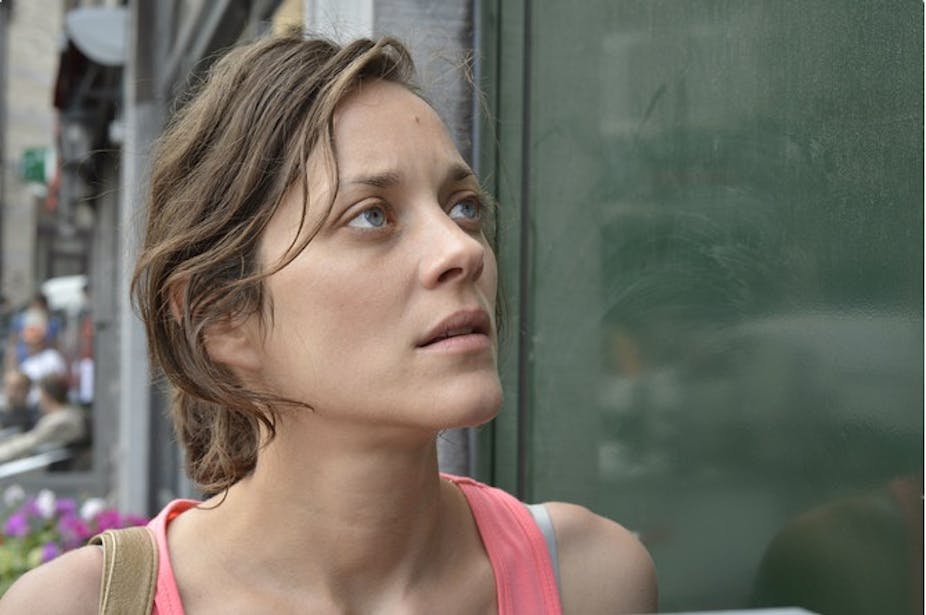Audiences familiar with Belgian directors Jean-Pierre and Luc Dardennes won’t need any recommendation to see their latest film, Two Days, One Night, which is on the program of the Melbourne International Film Festival. The brothers have twice won the Palme D'Or at Cannes, first for Rosetta in 1999 and then for L’Enfant in 2005, and have produced yet another feature in their brittle signature style.
The question for many will not be whether Two Days, One Night is worth watching, but whether there’s something to learn about the Dardennes that we don’t already know. I think there is.
The Dardennes Device
Every Dardennes film has what sci-fi villains call a Device: selling a baby, a bike, fake marriages, a child murdering a child, crepes.
The Device in Two Days, One Night is a workplace ballot, and it swiftly sets a dramatic tone for a film about precarious labour. Sandra (Marion Cotillard) is returning to work after a period of leave and finds that her co-workers have been given a choice for a collective vote: keep Sandra or keep their annual bonuses.
Acquiring colleagues’ votes becomes Sandra’s mission across the weekend. The time middle-class people usually set aside for leisure is consumed by the labour of staying middle-class. The film is littered with awkward signifiers of social aspiration - pizzas, ice-cream, a patio renovation, afternoon football. Some thicken the mood, others are just distracting.
Through telephone calls and home visits we come to understand the complexity of Sandra’s circumstances. Lower-income workers cannot afford to sacrifice a bonus to support others. The retention of an additional employee on a team of 16 could further jeopardise the renewal of existing fixed-term contracts.
The fear of unemployment overwhelms the workplace itself, eroding social bonds and distorting the relationships between managers and the managed. Sandra is expected to resolve a problem that can only be addressed through collective action and industrial reforms.
This is not the first foray into social commentary for the Dardennes brothers. Their film Rosetta provided the title – if not the content – for labour reform legislation in Belgium designed to protect adolescent workers on the minimum wage.
A cinema of industrial relations?
What could be the function of a storyline for which any satisfying resolution must exceed individual decision-making and the characters we encounter on screen?
This is a technical problem for film-makers because it is hard to make industrial dramas – well, dramatic. Work-related conflicts rarely exhibit poetic elegance. While fans of the Dardennes have been weaned onto startling sketches of post-industrial malaise, few have come to crave unstartling sketches of that same malaise. The startling bit matters.
Let’s imagine a world where career trajectories follow vertical lines upwards and eventually downwards. It would make sense in this world for films to be preoccupied with themes of maturity, leadership and self-improvement.
Most gangster movies work this way. Lowly mobsters get toughened up so they can pass through the ranks and become self-governing moguls. Hollywood has produced a raft of storylines modelled on this pathway: apprenticeship, mastery, despotism.
This is not the world in which most people live. It is certainly not the world in which the Dardennes make movies.
Two Days, One Night has little to say about mobility and aspiration, but much to say about immobility and retention. Retain your job. Retain your bonus. Retain your relationship. Consolidation through repetition is central.
Sandra’s desperation and humiliation is restaged with each co-worker, producing agonising repetitions loosely reminiscent of the direct cinema classic, Salesman (1968). Time does not expand or shrink with the turbulence of human emotion - the same thing happens twice, and then again and again.

Too many twists?
But the Dardennes become restless. As if in homage to Charlie Kaufmann’s Adaptation (2002), the film erupts in sudden bursts. Two Days, One Night is soon shot through by unwieldy attempts at emotional excitation: overblown conflicts, sentimental vignettes, quickly forgotten character revelations.
For want of a better term, the film becomes too cinematic. Rather than letting the mechanics of the situation play out, situations are multiplied to form a loose and unsatisfying web of personal dramas.
Along the way our protagonist acquires new qualities. At first, Sandra is not presented as a charismatic lead. Her situation could be that of any worker whatsoever in a post-industrial economy. But then, alongside revelations about her experience of depression, Sandra becomes a conspicuously good person.
For an ungenerous viewer, Two Days, One Night could be yet another film about self-determination and generosity. Perhaps the long-play of television is better suited to situations that cannot be wrapped up by confrontations between good and bad motivations. The wrapping in Two Days, One Night is certainly not neat, but it does feel over-wrapped nonetheless.
This film is a good example of the Dardennes’ trademark undecorated and unsentimental style. It constructs its depleted social reality with ease. For fans, though, it’s hard to watch this film without making comparisons to their earlier works.
A casual examination of shots, cuts, montages, soundtracking and cast members reveals too many similarities between Two Days, One Night and Rosetta, L’Enfant or Le Gamin Au Vélo. In previous films we barely noticed the impeccable fussiness of the screenplay; by comparison, Two Days, One Night can feel lumpy.
Despite some striking and funny moments, there’s too heavy reliance on a single gimmick – the Dardennes Device – to flesh out overlapping concerns about labour, depression, domesticity and social reciprocity. As a result, compared with previous offerings from the Dardennes, Two Days, One Night feels like hard work.
The Melbourne International Film Festival 2014 runs until Sunday August 17. See all MIFF 2014 coverage on The Conversation here.

